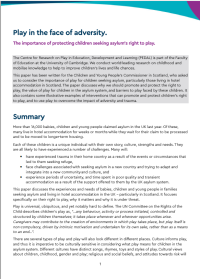Our paper, Play in the Face of Adversity discusses why and how we should promote and protect the right to play for children in the asylum system.
More than 16,000 babies, children and young people claimed asylum in the UK in 2022. Of these, many live in hotel accommodation for weeks or months while they wait for their claim to be processed and to be moved to longer-term housing. Each of these children is a unique individual with their own story, culture, strengths and needs. They are all likely to have experienced a number of challenges, and many will:
- have experienced trauma in their home country as a result of the events or circumstances that led to them seeking refuge
- face challenges associated with seeking asylum in a new country and trying to adapt and integrate into a new community and culture, and
- experience periods of uncertainty, and time spent in poor quality and transient accommodation as a result of the support offered to them by the UK asylum system.
Our paper discusses the experiences and needs of babies, children and young people in families seeking asylum and living in hotel accommodation in the UK. It focuses specifically on their right to play, why it matters and why it is under threat.
There are two reasons why we should protect and promote play for all children:
- Play is a basic right, a fundamental part of childhood which is part of children being well and thriving as citizens and members of communities.
- Play makes an important contribution to children’s development, helping children to thrive during infancy, childhood and adolescence and to become happier, healthier adults making positive contributions to society and the economy.
Alongside the universal benefits of play, play can have specific benefits for children who have experienced adversity, such as those seeking asylum. Play can help children overcome trauma; can provide some normality in a constantly changing world; can support integration, and can also maintain links with their culture and place of origin.
Play is resilient. Children – including children who have endured immense trauma and are living in the most adverse circumstances – seek opportunities to play and will find new and different ways to play in the face of such barriers and challenges. However, play is limited when children’s basic needs are not met and challenges in children’s lives can limit their resources, opportunities and freedom to play. These could include the lack of space or toys, lack of permission or time or psychological barriers which make it harder for children to feel safe, confident and comfortable to play.
Many children across the UK of different ages report challenges that prevent them from playing as much as they would like to. Alongside these, children seeking asylum experience a constellation of additional challenges that inhibit their ability to play. These include poor mental health resulting from experiencing trauma and displacement; separation from loved ones; the lack of space and resources in hotel accommodation; moving regularly and having limited access to educational settings, and cultural and linguistic barriers. Play can help to mitigate the impact of this adversity on children’s development and outcomes. Conversely, play deprivation is likely to further exacerbate the harms caused to children by their experiences of migration and seeking asylum and will impair their recovery from traumatic experiences.
The paper discusses the value of play for children in the asylum system and the barriers to play faced by these children. It also contains some illustrative examples of interventions that can promote and protect children’s right to play, and that use play to overcome the impact of adversity and trauma. It sets out recommendations for what policy makers and practitioners might do to protect and promote children’s right to play.


